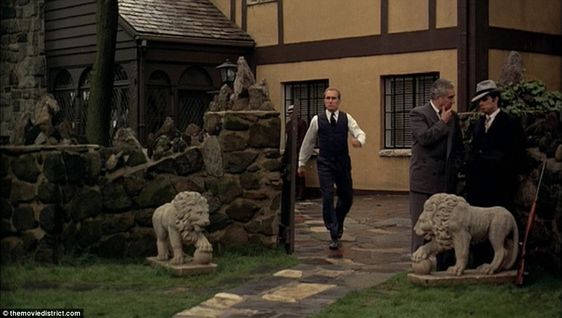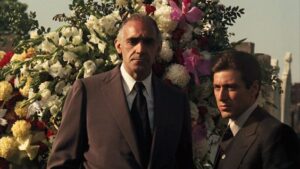
The Lore of ‘The Godfather’ Resurfaces at Roger Stone’s Trial

Few films or books have entered the American lexicon as deeply as this mob chronicle, which is set to play a role at the Stone trial in Washington.
As Roger J. Stone Jr. goes on trial in Washington, accused of obstructing investigations into a possible conspiracy to influence the 2016 election, one piece of evidence has nothing to do with Russia, Hillary Clinton’s emails, WikiLeaks or the Trump administration.
It’s Mr. Stone’s mentions of a character from “The Godfather: Part II” who gives false testimony during a Senate hearing on organized crime.
“Do a Frank Pentangeli,” Mr. Stone texted to an associate set to testify about him before a Congressional committee in 2017.
The message, according to prosecutors, was an attempt by Mr. Stone, a Republican political operative and longtime adviser to President Trump, to advise his associate to mimic Pentangeli’s obtuseness.
“I don’t know nothing about that,” Pentangeli demurs when questioned in the 1974 film about a character’s mob ties.
Witnesses have been pulling Pentangelis for years, and the surfacing of the term in the Stone case is just one of the many times where elements of the “Godfather” films, and the book on which they were based, have become pervasive in the real world.
Earlier this year, when a conservative detractor of the CNN host Chris Cuomo, whose brother, Andrew Cuomo, is governor of New York, sought to demean him, he referred to him as “Fredo,” the bungling sibling in the Corleone clan.
When someone makes you “an offer you can’t refuse,” or threatens to have you “sleep with the fishes,” they are repeating phrases largely made popular by the “Godfather” films.
Edward McDonald, a lawyer who as a federal prosecutor secured convictions against leaders of four of New York’s five Mafia families, said prosecutors are not immune from the pull of the language when chatting with colleagues. After offering a defendant a plea deal, he said, “You might say, ‘I made him an offer he can’t refuse: immunity instead of 10 years in prison.’”
(Mr. McDonald played himself in the mob movie “Goodfellas,” and one of his lines in that film to a mob associate’s wife (Lorraine Bracco) — “Don’t give me the babe-in-the-woods routine, Karen” — became memorable in its own right.)
Even mob guys have mirrored behavior from the “Godfather” films on occasion, as in 1977 when prosecutors said a man acting on behalf of the Colombo crime family was trying to secretly stash bribe money in a Long Island restaurant. He chose the same place where Michael Corleone finds the gun hidden for him in “The Godfather”— a toilet.
“Just like in the movies,” an undercover agent exclaimed on a wiretap after pulling the cash from the commode.
Though lines from other films have become part of the American lexicon — “I’ll be back” (Schwarzenegger, “The Terminator,” 1984) — few have had the enduring impact of the Godfather series, said Kenneth Dancyger, a professor of film and television at New York University’s Tisch School of the Arts. He attributed that to the unique combination of skilled scriptwriting, acting and directing as well as to the film’s insights into an American brand of power and corruption.
“At the heart of it,” Professor Dancyger said, “is family and honor and trying to protect the family from a corrupt world, which is what Don Corleone is trying to do.”
The scripts for the first two Godfather films were a collaboration by its director, Francis Ford Coppola, and Mario Puzo, the author of the book by the same name.
